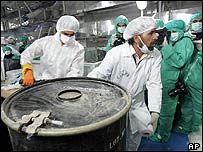
Iran says its nuclear programme is for purely peaceful purposes
|
Iran has broken all the remaining UN seals at its nuclear plant at Isfahan, making it fully operational.
The removal was completed under the supervision of the International Atomic Energy Agency, which has installed equipment to monitor activity.
EU countries quickly proposed a resolution to the United Nations nuclear watchdog in Vienna calling for Iran to stop the nuclear fuel work.
But Iran said again it had a right to develop nuclear technology.
The EU's draft resolution is scheduled to be heard at a meeting of the IAEA's 35-nation board on Thursday.
 |
NUCLEAR FUEL CYCLE
Mined uranium ore is purified and reconstituted into solid form known as yellowcake
Yellowcake is converted into a gas by heating it to about 64C (147F)
Gas is fed through centrifuges, where its isotopes separate and process is repeated until uranium is enriched
Low-level enriched uranium is used for nuclear fuel
Highly enriched uranium can be used in nuclear weapons
|
It is thought the resolution does not call for Iran's actions to be referred to the UN Security Council.
However, the BBC's Emma Jane Kirby in Vienna says the US and Britain are calling for tough action against Iran.
She says that although Iran has not broken international law by resuming uranium conversion work, the West believes it has certainly broken the spirit of the Vienna talks.
Matthew Boland, spokesman of the US Mission to the UN in Vienna, said: "Today's breaking of seals is yet another sign of Iran's disregard of international concerns."
But Iran's chief negotiator, Cyrus Nasseri, defended the move.
"All we want to do is to produce nuclear fuel and we are prepared to provide credible assurances to our European partners that we will not divert this to other purposes," he said.
Iran's new President, Mahmoud Ahmadinejad, has said he is ready for more talks and will put forward new proposals.
Sanctions
The EU and US suspect Iran's scheme is a cover for a nuclear weapons programme.
The EU wants Iran to resume its suspension of conversion work in return for economic and political concessions.
Iran suspended its nuclear programme in 2004 but has rejected the latest EU offer.
The West could call for sanctions on the grounds that Iran hid its uranium enrichment programme for 18 years, without telling the IAEA.
On Tuesday, Russia joined the mounting calls for Tehran to stop conversion work.
Russia is Iran's main partner in its effort to develop nuclear power and is helping the state to build a nuclear reactor at Bushehr.
Iran says it has the legal right under the Nuclear Non-Proliferation Treaty to carry out the nuclear fuel cycle.
The Isfahan plant is Iran's main uranium conversion facility. Conversion is an early stage in the nuclear fuel cycle, turning raw uranium - known as yellowcake - into the feedstock for enriched uranium.
Uranium enriched to a low level is used to produce nuclear fuel, while further enrichment makes it suitable for use in atomic weapons.

